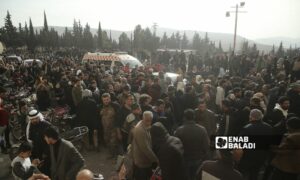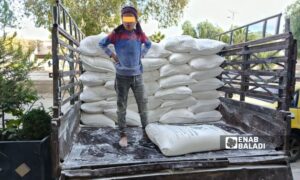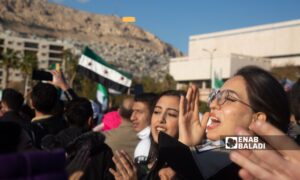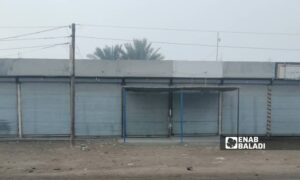
No more “coffee cups” in Syrian security basements due to newly anti-torture law

Enab Baladi – Saleh Malas
It is customary when the Syrian security forces summon opponents to say, “you are called to drink a cup of coffee with our boss,” and the unlucky ones will be subject to arrest from their homes or at the security barriers that connect most of the streets.
The term “coffee cup” is familiar in Syrian society and refers to the types of torture citizens are subjected to in security branches.
The degree of violence and torture in the basements of the intelligence services increased with the start of the Syrian revolution eleven years ago, to include to the arrest cycle opponents, activists, and participants in the peaceful movement, or citizens who were taken to the branches by chance, or for the similarity of names.
In addition, many other reasons allow a security officer in regime areas to arrest whoever he wants and whenever he wants.
However, since 30 March, the Syrian regime has approved a law criminalizing this behavior in interrogation rooms in return for obtaining information or confession from persons or because of their practice of a certain act or their refusal to do something.
Waggish law
Law No. 16 of 2022, issued by the head of the Syrian regime, Bashar al-Assad, on 28 March, aroused the ridicule of the Syrian people on social media platforms.
They considered that the “coffee cup” of the Syrian intelligence directorate has become legally forbidden amid thousands of torture stories reported by detained witnesses to Syrian and foreign organizations and before the Independent International Commission of Inquiry on Syria.
A report issued by the Syrian Human Rights Committee (SHRC) in 2014 identified 40 methods of torture against detainees, most notably beating on the soles of the feet (falaqa) and punching for a long time.
Among the terrifying methods are also “Shabeh” (Raising the detainee to the ceiling from his hands so that his toes touch the ground), “Blanco,” or “Shabeh from behind” (Handcuffing the hands behind the back and raising the detainee to the ceiling with a chain attached to them), and “al-Dolab” (Putting the legs inside the wheel of a car and hitting the feet very hard) or “Bisat al-Rih,” and electrocution, sexual assault, and nail pulling.
In August 2013, a military defector code-named Caesar smuggled 53,275 photographs out of Syria, according to the Human Rights Watch (HRW).
The leaked photos carried the largest argument that can be relied upon by human rights organizations and international courts to condemn the regime’s government for war crimes against Syrian detainees inside its detention centers.
“The photos provide irrefutable evidence of widespread torture, starvation, beatings, and disease in Syrian government detention facilities,” the HRW said.
In 2015, al-Assad denied the credibility of torture images, saying during an interview with Foreign Affairs magazine, “You can get photos from anyone and claim torture, there is no verification of this evidence. Therefore, they are all allegations without evidence.”
The Syrian regime has a record of showing a systematic policy to suppress any opposition by arresting and torturing its members. In some cases, this torture extends to family members or friends of the detainee to force him to confess or provide information.
In turn, the Human Rights Watch mocked the law, saying: “This is not an April Fools’ joke. Syria, where torture is routine and pervasive, has passed a law criminalizing the practice. In an announcement that might have appeared as satire.”
Adding that “It is hard to take something like this seriously, given how pervasive the use of torture is by Syrian state authorities. As Human Rights Watch and others have extensively documented, Syria has arbitrarily detained and tortured tens of thousands of people in what amount to crimes against humanity.”
Contradicting international agreements
During an interview with Foreign Affairs magazine seven years ago, al-Assad called for an “impartial and fair way to verify all these allegations.”
At the same time, the regime refuses to grant the Investigation Committee and the International, Impartial and Independent Mechanism for Syria (IIIM) permission to enter its prisons in order to create the possibility of inspecting them and knowing the fate of the detainees.
The new law criminalizes torture and imposes up to three years in prison, with the penalty up to the death penalty in the case of rape or death.
It also prohibits any authority from ordering the torture of anyone and stipulates that evidence collected during torture is void.
With the existence of this law, Article No. 16 of Law No. 14 of 1969 remains in force, which stipulates that it is prohibited to prosecute any of the employees of the State Security Department for crimes they commit while carrying out the specific tasks entrusted to them or in the course of carrying out them unless pursuant to a prosecution order issued by the director.
The law did not provide for any neutral mechanism for oversight and inspection regarding the activation of the law and the implementation of its contents or even an indication of an entity that may undertake these tasks independently.
In terms of the time period of enforcement of the law, its provisions do not apply retroactively because its provisions are stripped of this principle, and therefore no person who was arrested before the date of publication of the law will benefit from these provisions.
The crime stipulated by the law is subject to the criminal statute of limitations in Syria, and the limitation period for the offense described as “criminal” falls within the expiration of ten years for the public rights lawsuit and the personal rights lawsuit.
This is from the date of the commission of the felony if no prosecution has taken place during that period, according to Article No. 437 of the Code of Criminal Procedure.
The criminal statute of limitations applies to a criminal complaint or a civil lawsuit arising from the crime, and it also applies to the penalty that the accused can be sentenced to, which is what is meant by the statute of limitations for the penalty.
Thus statutes of limitations are laws that set temporal limits for crime and punishment.
The statute of limitations contradicts international law, as an international convention has adopted the principle of “no statute of limitations” for crimes deemed difficult to prosecute immediately after their commission, and this applies in particular to war crimes, crimes against humanity, or genocide.
Syria is a party to the United Nations Convention against Torture, which it acceded to in 2006.
Last longing distortions
It is difficult for the HRW to speculate about the power structures of an arbitrary nature, and believes that “the passage of the law could be a response to ongoing efforts to prosecute the use of torture by Syria officials in the conflict, including an effort by some states to hold the Syrian government accountable for torture under the United Nations Convention Against Torture. “
A statement issued by the Dutch House of Representatives on 18 September 2020 stated that a memorandum was submitted to the Syrian mission to the United Nations, calling on the regime to hold talks on the human rights violations it committed in Syria before the International Court of Justice in The Hague.
Based on this statement, the Netherlands submitted a memorandum to the regime’s government calling on it to fulfill its international responsibilities due to torture in its detention centers and the use of chemical weapons in Syria.
“The Assad regime has committed horrific crimes time after time. The evidence is overwhelming. There must be consequences,” according to the statement.
The France-based Syrian lawyer Zaid al-Azm said the law is a continuation of a condition that Syria signed when it joined the Convention against Torture in 2006.
But it is an attempt to “beautify the distortions of power that will not be removed by any law far from the actual application,” he added.
Such legal moves are propaganda before the world to spread propaganda that Syria is open to change, coinciding with the openness of some countries to the Syrian regime in the recent period, al-Azm told Enab Baladi.
Trials in the EU countries are working to reduce the gap in international accountability for human rights violations in Syria through lawsuits against the perpetrators of violations under “universal jurisdiction.”
The legal advisor to the Syrian Center for Justice and Accountability (SCJA), lawyer Owais al-Dabsh, told Enab Baladi that human rights organizations will not benefit from a law criminalizing torture in Syria since its existence or non-existence is the same.
Al-Dabsh said the law will not be translated into practical benefit in Syria for reasons that are almost self-evident and that it will only be a stride for political investment.
The Syrian regime should start holding accountable those responsible for torture over the past decade, releasing all those arbitrarily detained in official and unofficial detention centers, as the HRW demanded.
As well as make a serious contribution to an international and independent effort to identify and reveal the fate of thousands of disappeared and missing people.
if you think the article contain wrong information or you have additional details Send Correction
النسخة العربية من المقال
-
Follow us :

















 A
A
A
A
A
A








 More Society
More Society